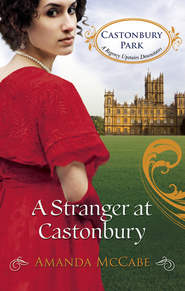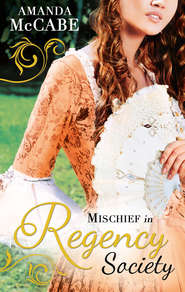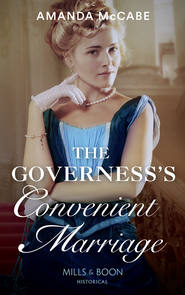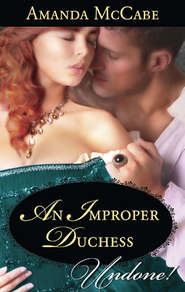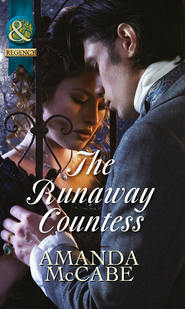По всем вопросам обращайтесь на: info@litportal.ru
(©) 2003-2025.
✖
The Shy Duchess
Настройки чтения
Размер шрифта
Высота строк
Поля
He opened the bottom drawer of the desk to reach for more writing paper, and in the dim depths he caught a glimpse of a small gold-and-enamel case. Its deep colours, red and blue and gold, lured him to reach for it.
Usually he could ignore its call, could leave it buried in the drawer, hidden from view behind paper and boxes of sealing wax. Today, though, some deep force compelled him to take it out, to hold it in his hand.
The metal quickly warmed in his clasp, and he stared down at it for a long moment before opening it. A woman’s painted pink smile greeted him, her brown eyes soft with welcome. In the miniature portrait, her dark hair fell loose over the shoulders of her red velvet gown, and she smiled eternally.
Valentina. His lost wife.
Nicholas gently stroked his thumb over the image, feeling only the roughness of the paint and no smooth, warm skin. She smiled back, always silent. In the much-too-brief time they knew each other, she was always laughing.
He put down the painting and buried his face in his hands as he remembered. He usually would not let himself think of her; it was long ago, and to remember was much too painful. But for some reason today she seemed near him.
He met Valentina Magnani on his Grand Tour, not long after his father and stepmother died and his stepbrother Brenner arrived to help them in their loss—the first time they met this son of Nicholas’s stepmother’s first, abandoned marriage. Nicholas was young then, barely out of university, and green as grass. Brenner thought a journey across the Continent, a time to learn more of his duties while still being largely free of them, would do him good.
And it had. At first he sorely missed his family, having never really been away from them before, but then the art and culture, the beauty of nature, enthralled him. They helped him heal from his loss, and he sent home many sculptures and paintings to adorn the ducal houses. He slowly started to find himself, who he might be apart from his family.
Then he came to Verona, Romeo and Juliet’s city—and met Valentina one day at the market as she did her family’s shopping. She was tall, honey-skinned, with satiny black hair and bright, dark eyes. She laughed at his clumsy attempts to speak Italian to the merchants, and helped him buy his fruit and bread. He was enchanted by her, by everything about her—her happy laughter, the glimpse of her red, ruffled petticoat at the hem of her brown skirt, the vivid, joyful life of her. She made him feel brought back to life, too.
He walked her home that day, carrying her basket for her, listening to her musical voice teach him more words of Italian, becoming more infatuated with every step. He met her mother, took tea with them. They were a respectable family of the city, her father an attorney, but they were decidedly not nobility. Not suitable duchess material.
Nicholas opened his eyes to stare blindly out at his library, the vast, dimly lit space, shadowed by soaring shelves of leather-bound books and crowded with heavy, old furniture. In the corners lurked statues from that voyage, pale marble gods and goddesses who stared back at him with their cold eyes. He had hoped to bring home more than art, more than freezing stone. He hoped to bring back life and laughter, a wife. A family.
His courtship of Valentina was quick, passionate. After all, he came from a line of people who gave all for the sake of love—his own blood ran just as hot, and he had never felt for anyone as he did for Valentina, either before or since. He craved her presence, her smile, her kiss, wanted to be with her all the time, and she felt the same for him. They went on long walks all over the city, kissing passionately in silent alleyways, in dusty museum galleries. He sat in her family’s drawing room and listened to her play the harp while her siblings ran around them.
Her home reminded him of his own at Welbourne Manor, where his brothers and sisters dashed about amid the ring of laughter. They would love Valentina, he knew, even if society wasn’t so accepting. They would help him make her happy even in grey, damp England, he was sure of that. So he married her in a little Verona chapel. He raised her lace veil and kissed her in the glow of stained glass, and had never been happier than in that one perfect moment.
Happiness was not to last, though. They went to a country villa for their honeymoon: long days of golden sun; warm, dusty nights of passion. Even before they returned to Verona, Valentina was pregnant. There could be no question of returning to England until she and the child could travel, so Nicholas waited to write to his family until he could announce both the marriage and the baby. Otherwise they would come rushing to him, and he wanted Valentina to himself awhile longer.
Thirteen months he was a husband, barely more than a year. One hour he was a father, to a tiny son who lived such a brief life. Then both the baby and Valentina were gone. The laughter and light were vanished as quickly as they began, and he was alone.
Well, not entirely alone. He had his family, his duty, his cursed title. After his wife and child were buried, he left Italy for home once again, his heart left behind under that cemetery cypress tree outside Verona, and he devoted himself to his family. He kept that brief marriage a secret, for he could not bear to speak of it, even to his sisters. He couldn’t bear the pity he would have seen in their eyes.
Over the years, the pain faded. He learned to cherish the memory of Valentina without despairing of what might have been. Only once in a while, on days like this, did he take out her portrait and try to imagine her near him again.
It became harder all the time. She moved further into the past. Yet a vivid fear remained, especially when he was told yet again he should do his duty, marry and produce children. How could he put another woman through the pain and fear Valentina suffered when their son was born, the agony when the baby died in her arms? How could he hurt a woman like that, watching her suffer and knowing it was his fault?
He would surely never love another as he had Valentina, but he would not marry without at least liking and respecting a lady. And he could not inflict that on someone he considered a friend.
Perhaps Stephen would marry, despite his protestations, and have children who could inherit the title. Yet that seemed unlikely. He was too busy with his racetrack scheme to consider a proper marriage.
Nicholas carefully put the portrait back into its case and hid it once more in the dark drawer. That past was gone, and he had to remember that.
But that did not mean he was quite ready to face answering all those invitations just yet. He left them on his desk and went to the window to stare down at the windswept street, at all the passers-by hurrying on their busy way. Nicholas always wondered where they were going, what purpose drove them onwards during their day.
Sometimes they stopped to peer past his wrought-iron gates, no doubt wondering the same thing about him. What did a duke do behind his grand walls? Manning House was one of the largest houses in London, a vast, impractical edifice of pale stone and copious windows his grandfather had built and which they were now stuck with for ever. It was grand and impressive, surrounded by gardens, crowned by a large ballroom and a dining room large enough for a state dinner. But it was impossible to heat, and right now it was good only for nieces and nephews to chase each other down the wide corridors, once they were old enough.
It needed a mistress, a hostess to redecorate the fusty old chambers and arrange for parties to suit its grandeur. Yet another reason to put the past away and think of that blasted, ever-present Duty.
Nicholas reached for the edge of the velvet drapery to draw it across the window. Maybe if he couldn’t see outside he couldn’t be distracted by what was happening on the street. As he tugged it closer, he glimpsed an open carriage rolling slowly past on the street, carrying two stylishly dressed ladies whispering together. One of them turned her head slightly, and a ray of pale sunshine caught on a blonde curl, a soft white cheek. It was Lady Emily Carroll.
She laughed at whatever her friend was saying, her pale cheeks flushed pink. She swept back that errant curl with her gloved hand.
How beautiful she is, Nicholas thought with bemusement. Oh, he had always known Lady Emily was beautiful; she was famous for it, and it was easy to see in the perfect symmetry of her heart-shaped face. He was struck by it last summer at Welbourne, but then forgot when she seemed not to like him.
Now, with her face alight with laughter, the sun on her hair, he saw it all over again. What could make her laugh like that? What could he possibly say to make her smile?
It was a challenge indeed. And a Manning was never one to back away from a challenge.
The carriage turned the corner, seeming to head toward the park. It was nearly the fashionable hour, when all the ton piled on to their horses and into their carriages and paraded past each other yet again.
Nicholas turned away from the window, and from the work that waited at his desk, and strode out of the library. All that could wait. “I need my horse saddled! “ he called. “Quickly!”
Chapter Four
“Look, Emily! It’s Manning House. Isn’t it lovely?” Jane cried, gesturing at the vast mansion as their carriage bounced past. “Like a palace in a fairy story.”
Emily laughed as she studied the gleaming windows, laid out like endless rows of diamonds in white stone expressly to show off wealth great enough to counter any window tax. She remembered a line she learned once in lessons on Tudor history—’Hardwick Hall, more glass than wall.’ Somehow, it was hard to imagine the duke living there in that chilly mausoleum.
“If the fairy story is about the Snow Queen, bringing down winter from her mountain fortress,” she said. “It looks mightily uncomfortable.”
“But excellent for grand balls,” Jane declared, her gaze still fastened on the house. “Can’t you just imagine being the hostess of such a gathering? Being a duchess?”
“I can imagine it,” Emily said, still laughing. “It sounds horrid. Everyone staring all the time, everyone pestering for invitations to those grand balls …”
“Exactly! The Duchess of Manning would utterly rule society. She could set every fashion. Wouldn’t that be wonderful?” Jane sighed deeply, glancing back over her shoulder as they turned a corner and Manning House disappeared from view.
Emily’s laughter faded, a sneaking suspicion setting in as she studied her friend’s narrowed eyes. “Jane, have you set your cap at the Duke of Manning?”
“Oh, la, no!” Jane cried. The brief glint of calculation faded as she giggled. She straightened her feathered bonnet on her auburn curls and sat back against the carriage cushions. “I’m not such a fool as that. I’m too harum-scarum to ever be duchess material. That’s your department, Em.”
“Mine?” Emily said, shocked. “Of course not. I would make a wretched duchess.”
“Nonsense. You seem born to royalty, with your looks and your quiet grace. And since there is no eligible prince at present, a duke would be the next best thing. Especially one as handsome as Manning.” Jane leaned closer and whispered, “Don’t his blue eyes just make you want to melt?”
Well—they did, actually. Whenever he looked at Emily she longed to sink down through the floor, robbed of any powers of speech she might once have possessed. But she would never admit that, not even to Jane. Not even to herself.
“He is quite fine-looking,” she said carefully.
“Fine-looking?” Jane scoffed. “He is a veritable Greek god. My parents would be in alt if I could catch him, of course, but it would never happen. I shall have to settle for some country baronet, I suppose, like William Jameson. He seems on the verge of making an offer. What about you?”
Emily laughed. “I’m not in the least bit interested in Sir William!”
“Certainly not, who would be? That nose! But there must be someone you like?” “No, there’s no one.” “I cannot believe that.”
“Believe it, my dear Jane. I have met no one this Season I could be really fond of. Perhaps I shall have to find a country squire, too. Maybe a nice curate?”
She spoke in jest, but really a curate would be just right. An earnest, sincere young man who would read to her by the fire in the evenings. Who would ask for her help with his sermons, and praise her charity work in the neighbourhood and never grab her suddenly as Mr Lofton had. It would be perfect—if he had a roguish smile like the duke …
Emily gave her head a hard shake. “That is what I need.”







